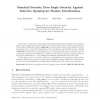Free Online Productivity Tools
i2Speak
i2Symbol
i2OCR
iTex2Img
iWeb2Print
iWeb2Shot
i2Type
iPdf2Split
iPdf2Merge
i2Bopomofo
i2Arabic
i2Style
i2Image
i2PDF
iLatex2Rtf
Sci2ools
116
click to vote
TCC
2016
Springer
2016
Springer
Standard Security Does Imply Security Against Selective Opening for Markov Distributions
About three decades ago it was realized that implementing private channels between parties which can be adaptively corrupted requires an encryption scheme that is secure against selective opening attacks. Whether standard (IND-CPA) security implies security against selective opening attacks has been a major open question since. The only known reduction from selective opening to IND-CPA security loses an exponential factor. A polynomial reduction is only known for the very special case where the distribution considered in the selective opening security experiment is a product distribution, i.e., the messages are sampled independently from each other. In this paper we give a reduction whose loss is quantified via the dependence graph (where message dependencies correspond to edges) of the underlying message distribution. In particular, for some concrete distributions including Markov distributions, our reduction is polynomial.
Cryptology | TCC 2016 |
Related Content
| Added | 10 Apr 2016 |
| Updated | 10 Apr 2016 |
| Type | Journal |
| Year | 2016 |
| Where | TCC |
| Authors | Georg Fuchsbauer, Felix Heuer, Eike Kiltz, Krzysztof Pietrzak |
Comments (0)

